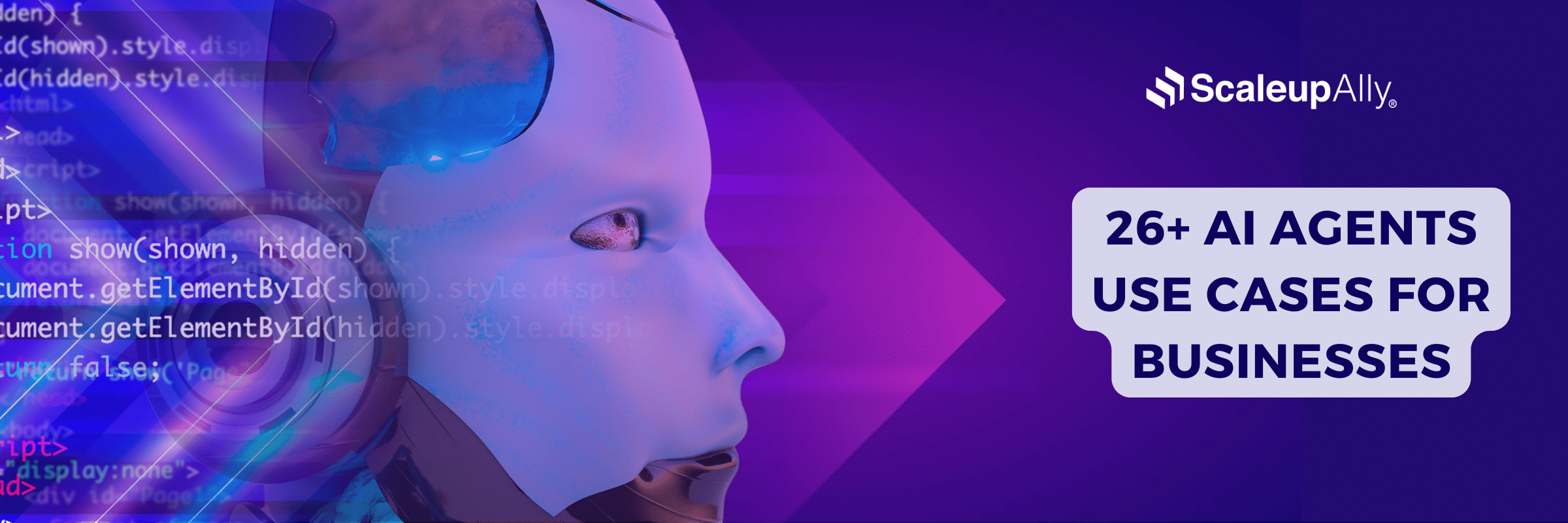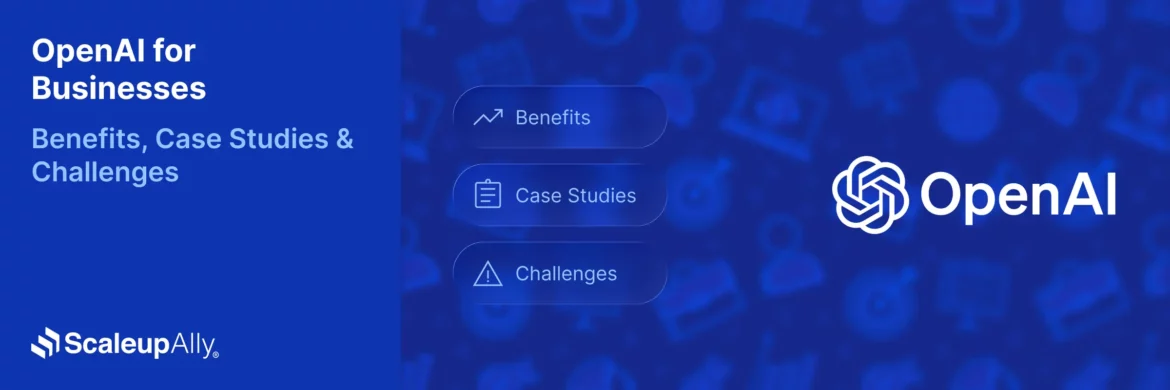
26+ AI Agents Use Cases for Businesses
Manu Jain | April 23, 2025 , 16 min read
Table Of Content
In today’s fast-changing digital world, AI agents are no longer just a new idea they are becoming an important part of how businesses work. From helping with customer support to predicting problems in the supply chain, AI agents are changing the way companies run, improve and grow.
Whether you’re a CIO looking to automate your company or a startup founder trying to stay ahead of the competition, knowing the top ways to use AI agents can help you get long-term results.
In this blog, we’ll explore over 26+ real-world AI agent use cases, categorized by industry and provide best practices, trends and insights to help you implement AI efficiently and effectively.
Key Takeaways
- AI agents help IT teams reduce downtime by up to 70% through predictive incident management and automated bug detection.
- Sales and marketing departments use AI to improve lead conversion by 50% with intelligent lead scoring and personalized campaigns.
- In finance, AI agents have helped detect fraudulent transactions with 97% accuracy, reducing manual reviews significantly.
- Ecommerce and retail sectors report up to 29% sales uplift with AI-powered product recommendations and dynamic pricing models.
- Healthcare is leveraging AI to detect diseases early, with diagnostic accuracy rivaling human specialists in some cases.
AI Agents Use Cases for Businesses
AI agents are no longer just tech buzzwords they are quietly transforming the way businesses operate behind the scenes. From helping developers catch bugs faster to supporting doctors with early diagnostics, these intelligent tools are making real impact. Whether it’s IT, finance, retail or healthcare, AI agents are driving innovation across the board.
Here’s a breakdown of 26+ real-world use cases that show how they’re reshaping industries, one smart solution at a time.
IT Support & Development
1. Automated Bug Detection
Think of AI as a super-fast code checker. It uses smart computer programs to look through tons of code and find mistakes, security holes and things that make the program slow. This helps programmers fix problems before they cause trouble for everyone using the software.
The AI also learns from past mistakes, so it gets better at finding new ones. It can even tell the programmers which problems are the most important to fix and suggest ways to fix them quickly. This makes the software better and helps get new versions out faster.
2. Virtual DevOps Assistants
AI-powered virtual DevOps assistants automate tasks like code deployment, infrastructure provisioning, system monitoring and so on. They can integrate with tools like Jenkins, Docker, load balancer and Kubernetes to optimize CI/CD pipelines on development task.
These agents also analyze deployment log and system metric to find patterns, flags anomalies and bugs and provide actionable insights by minimizing human intervention and operational overhead.
3. Smart Incident Management
Using Natural language processing and predictive analytics, AI agents enhance IT incident response by auto categorizing tickets, predicting issue severity and routing them to the right support teams to resolve the same.
These agents also detect potential system failures before they occur to enabling proactive resolution. As they learn from past incidents, they improve root cause analysis and reduce the time to resolution.
Sales and Marketing
1. Lead Scoring and Qualification
Businesses are leveraging AI decision-making tools to optimize lead prioritization. By analyzing behavioral data like email engagement and demographic information like industry, job title and so on, these systems identify high-conversion leads.
The AI continuously refines its scoring models based on successful conversions, automating lead qualification. This allows sales teams to concentrate on the most promising prospects, boosting conversion rates and accelerating sales cycles.
2. Personalized Marketing Automation
Now the days AI agents use natural language processing and behavioral data to create hyper-personalized content and send it at minimal times across email, social media and web platforms. They analyze user preferences like past purchases and click patterns to trigger automated highly relevant interactions on time.
This not only enhances customer engagement but also increases conversion rates by delivering the right message to the right audience at the right moment that generate the hotter leads.
3. Sales Forecasting
AI agents leverage predictive analytics to forecast future sales with high accuracy by analyzing historical data, seasonal trends and external market conditions on the basic of past data. These agents are best to find such as economic changes, supply chain disruptions, or new competitor actions.
The result is a data-backed sales strategy that allows business leaders to allocate resources more effectively and meet revenue goals with confidence.
Finance
1. Fraud Detection Systems
AI agents use advanced machine learning algorithms to find fraudulent activities by monitoring transactions in real time. These system flags are suspicious patterns such as unusual purchase behavior, abnormal login locations, or duplicate transactions before they can cause damage for system and impact business growth.
Over the time AI improves its accuracy by learning from false positives and confirmed fraud cases. Financial institutions benefit from increased security, reduced manual review efforts and faster fraud resolution.
2. Expense Management Automation
AI agents streamline finance operations by automating the entire expense management cycle. They scan receipts, transactions bill, flag policy violations and even auto-approve routine that claims all with minimal human oversight. This reduces unnecessary workload, ensures compliance and speeds up reimbursement times.
Some platforms also use Open CV to extract key data from scanned invoices/bill and apply business rules to make real-time decisions.
3. Credit Scoring
Traditional credit scoring often relies on limited data such as credit history and debit ratios. AI agents however, analyze a wider range of factors like online behavior, transaction history, employment patterns and even psychometric data to evaluate credit more accurately. This enables more inclusive lending by providing access to credit for those with thin or no credit files, while also reducing default risks.
Human Resources
1. AI-Powered Recruiting Assistants
AI agents streamline recruitment process by using Recruit Assistant to analyze resumes, identify top candidates and match them with job descriptions and language. These assistants also automate interview scheduling, send follow-up messages and track applicant status until process end.
They help reduce hiring bias and significantly shorten time-to-hire by filtering unqualified applications early in the funnel freeing up HR teams to focus on higher-level decision making for another task.
2. Employee Onboarding Agents
AI powered virtual onboarding assistants guide a new employee through HR processes such as documentation, enrollment, company policies and required training with ongoing process. These agents offer 24/7 availability and respond to FAQs in real-time and ensure a smooth and consistent onboarding experience with respect to company guideline.
They can also integrate with LMS (Learning Management Systems) to track the progress and provide reminders to enhancing productivity and engagement from day one so that employee can show their productivity from beginning.
3. Sentiment Analysis for Employee Feedback
AI powered agents use sentiment analysis on survey, internal chat and performance reviews to measure employee engagement, detect dissatisfaction and identify cultural challenges. By analyzing linguistic patterns and emotional tone and grammar mistake.
These agents offer HR teams actionable insights into team morale and organizational health allowing early interventions and improved retention strategies to find the best insights for decision making.
Ecommerce
1. Product Recommendation Engines
AI agents analyze customer behavior such as browsing patterns, past purchases, cart additions and even time spent on product pages to deliver real-time, personalized product suggestions to make the customer more engaging.
These recommendation systems leverage collaborative filtering and deep learning models to increase cross-sells, upsells and average order value. Personalization not only boosts revenue but also enhances customer satisfaction by making shopping experiences more relevant and efficient.
2. Dynamic Pricing Optimization
AI agents use predictive analytics to dynamically adjust product prices in response to factors such as demand fluctuations, competitor pricing, inventory levels and user behavior. These models evaluate real-time market data to recommend the optimal price that maximizes profit while maintaining competitiveness and product quality.
Dynamic pricing strategies are widely used in travel, retail and online marketplaces to drive sales without compromising margins and losing the customer base.
3. Customer Query Handling
AI-powered chatbots and virtual assistants offer 24/7 support to handle customer inquiries like product questions, shipping updates, return policies and order tracking. These agents use Natural Language Processing to understand and respond accurately, escalating to human agents when necessary.
This reduces support team workload, improves response time and enhances the customer experience across multiple touchpoints like websites, apps and messaging platforms to build the trust on company.
Supply Chain
1. Demand Forecasting
AI agents leverage historical sales data, market trends, seasonal patterns and even external signals like weather, festival, social sentiment to predict future product demand. This improves inventory planning, reduces stockouts or overstocking and enhances supplier coordination. These forecasts are more accurate and responsive than traditional methods because the models constantly learn and adjust in real-time. All the company now a day use these type agents to understand the market cap.
2. Inventory Optimization
AI agents help businesses maintain the right inventory levels across warehouses and retail outlets by analyzing sales velocity, storage costs, reorder points and supplier lead times. These agents can dynamically adjust reorder quantities and recommend inventory redistribution.
This reduces holding costs and ensures that the most in-demand products are always available, improving fulfillment rates and customer satisfaction.
3. Supply Chain Risk Management
AI agents identify and mitigate potential risks by monitoring supplier data, logistics updates, geopolitical factors and natural disasters. Using predictive analytics, they can recommend alternate suppliers, reroute shipments or adjust sourcing strategies before disruptions occur.
This proactive approach ensures business continuity and resilience in an increasingly volatile global supply chain environment.
Retail
1. AI-Powered Visual Search
AI agents allow customers to search for products using images instead of text. Visual recognition algorithms scan and analyze uploaded photos, matching them with similar or identical products in the store’s inventory. This enhances the shopping experience, especially for customers who don’t know how to describe what they want in words. It also reduces friction in product discovery and boosts conversion rates.
2. In-Store Analytics with AI
Retailers use AI agents with computer vision and IoT sensors to monitor foot traffic, analyze shopper behavior and optimize product placements. These insights help businesses decide where to place high-demand items, improve layout flow and adjust staffing based on customer density in real time.
It’s like having a digital eye on the store floor 24/7 to boost both sales and customer satisfaction.
3. Customer Sentiment Prediction
AI agents analyze online reviews and feedback on, social media and customer service data using deep learning and sentiment analysis to determine how customers feel about products or services.
These insights help retailers respond faster to negative feedback, identify popular items and even forecast future trends based on emotional patterns. It’s a game-changer for proactive brand management and improving customer loyalty.
Healthcare
1. AI in Diagnostics
AI agents assist in detecting diseases by analyzing medical images (X-rays, MRIs, CT scans and U-sound) and doctor advice slip of patient data with high accuracy. Using deep learning and advance AI, these systems can identify early signs of cancer, heart attack condition and neurological disorders faster than traditional methods. They help reduce diagnostic errors, speed up treatment and support doctors in making more confident decisions, especially in radiology and pathology.
2. Virtual Health Assistants
AI-powered virtual health assistants offer 24/7 support for patients by providing medication reminders, appointment scheduling, symptom checking and general health advice. They use ML/AI to interact conversationally and can escalate to human professionals if needed.
These agents help reduce the burden on healthcare staff and improve patient engagement, especially for chronic disease management or post-discharge care.
3. Personalized Treatment Planning
AI agents analyze electronic health records, genetic information and lifestyle data to recommend customized treatment plans for individual patients. This precision medicine approach helps optimize therapies, reduce side effects and improve recovery outcomes. AI also supports oncologists and specialists by suggesting evidence-backed treatment paths based on massive datasets and clinical trial insights.
Real Estate
1. Property Valuation Automation
AI agents analyze a wide range of data points, market trends, location metrics, amenities, historical pricing and nearby transactions to automatically estimate the value of residential or commercial properties. This helps buyers, sellers and agents make data-driven decisions quickly, reducing the reliance on manual appraisals and speeding up the closing process. These systems continually learn and adapt to market changes, making them more accurate over time.
2. AI Chatbots for Property Search
Virtual assistants help users find properties based on preferences like location, price, amenities and lifestyle needs by using natural language queries. These AI chatbots can work across websites, apps and even messaging platforms to provide real-time recommendations, schedule viewings and answer FAQs freeing up agents for more strategic work.
3. Predictive Lead Scoring for Agents
AI agents evaluate buyer or seller leads by analyzing behavioral patterns, inquiry history, financial background and market interactions. This helps real estate agents prioritize high-intent prospects, increasing conversion rates and reducing time wasted on cold leads. It’s especially useful for agencies managing hundreds or thousands of contacts simultaneously.
Logistics
1. Route Optimization
AI agents analyze real-time traffic, weather conditions, road closures, delivery time windows and fuel efficiency to generate the most optimal routes for delivery fleets. This minimizes delays, reduces fuel consumption and improves customer satisfaction. Logistics companies like UPS and FedEx use these systems to save millions annually by dynamically rerouting vehicles mid-journey.
2. Autonomous Delivery Management
AI-powered robots and drones are transforming the last-mile delivery landscape. These agents use computer vision and machine learning to navigate, avoid obstacles and deliver packages autonomously. Additionally, AI systems coordinate these deliveries, managing traffic flow, ETA predictions and package security.
3. Predictive Maintenance of Fleet
AI agents monitor vehicle telemetry and usage data to predict when a truck or delivery van will need maintenance. By detecting early signs of mechanical issues, they help logistics firms prevent breakdowns, extend vehicle lifespan and reduce unexpected downtime. This shift from reactive to predictive maintenance saves costs and ensures smoother operations.
Best Practices for Implementing AI Agents Effectively
AI agents can be game-changers but only when they are used with purpose and care. It’s not just about having the latest tech. it’s about knowing how to use it in ways that actually move the needle. Before diving in, take a moment to understand what makes AI implementation truly work. Here are some practical tips to help you set things up for long-term success and real results
Define Clear Business Objectives
Before integrating AI agents, businesses must identify the exact problem they aim to solve.it customer service automation, predictive maintenance or sales forecasting. Clear goals guide model selection, data collection and performance evaluation. Without this foundation AI deployments can become expensive experiments rather than scalable solutions.
Prioritize Quality Data Collection
AI agents are only as good as the data they learn from. Collect structured and unstructured data relevant to the use case, ensuring it’s accurate, clean and unbiased. Involving data governance teams early helps avoid issues like overfitting, hallucinations or misleading insights down the line.
Start Small, Then Scale
Pilot the AI agent in a limited environment (e.g. one team or process) before rolling it out company wide. This helps assess ROI, gather feedback and fine-tune performance. Once validated, the solution can be scaled across departments with confidence and agility.
Build Ethical and Compliant Systems
Ensure AI agents follow data privacy laws and avoid algorithmic bias. Transparent AI models and explainable decision-making are crucial for industries like finance, healthcare and HR. Ethics in AI is not just a compliance requirement but a brand differentiator.
Integrate with Human Workflows
AI agents shouldn’t replace humans but enhance them. Integrate AI into existing workflows to augment decision-making, automate routine tasks and free up teams for higher-level strategy. Hybrid teams where humans oversee and collaborate with AI trend to see higher adoption and better outcomes.
Continuously Monitor and Optimize
Post-deployment, AI agents need regular updates and retraining to remain effective. Monitor KPIs, user behavior and model drift. Feedback loops from real users help refine both performance and user experience over time.
Future Trends in AI Agents
As AI technologies mature agents are transitioning from narrow task-doers to autonomous goal-oriented co-pilots. The next generation of AI agents will combine generative AI with symbolic reasoning to enable natural conversations, deeper context awareness and smarter decision-making. Multi-agent collaboration will allow fleets of AI agents to solve end-to-end workflows like managing an entire product launch or supply chain without human intervention.
Innovations like blockchain-integrated decentralized agents will ensure transparency, auditability and secure peer-to-peer transactions. Ethical alignment explain ability and real-time adaptability will become standard features, making AI agents trusted collaborators in C-suites, ops floors and innovation labs across industries.
Conclusion
AI agents are transforming how businesses operate boosting efficiency, improving decision-making and unlocking new value across industries. As they continue to evolve with generative and autonomous capabilities, early adoption and thoughtful implementation will be key for organizations looking to stay ahead in the AI-first future.
At ScaleupAlly, we specialize in delivering cutting-edge Generative AI services and solutions tailored to your business needs.
Frequently Asked Questions
Q: Can small businesses benefit from AI agents?
Absolutely. AI agents can help small businesses automate repetitive tasks, provide customer support, generate leads and optimize operations without needing large IT teams or expensive infrastructure.
Q: What industries use AI agents the most?
Industries like IT, healthcare, finance, retail, logistics and eCommerce are leading adopters. However, AI agents are increasingly being applied across sectors such as education, real estate, frozen and human resources.
Q: Are AI agents expensive to implement?
Not necessarily. Many AI tools are now available as affordable SaaS or API-based solutions. Costs depend on use case complexity, but even startups can begin with low-code/no-code AI agents or open-source frameworks.
Author Spotlight
, SDE -II
Related Blogs

OpenAI for Businesses [Benefits, Use Cases & Challenges]
Discover the benefits of OpenAI for businesses. From reducing costs to scaling operations and enriching customer experiences. Real-world use cases included.
ScaleupAlly Team
Dec 16 ,
11 min read

Best 11 Agentic AI Tools in UAE: Accelerating Digital Transformation
Discover the top 11 agentic AI tools in UAE for 2025. Explore features, benefits, and tips to choose the right AI tool for your business growth.
Manu Jain
Nov 6 ,
9 min read

How to Choose an AI Development Company in Dubai: A Complete Guide
Find out how to choose the right AI development company in Dubai. Learn key factors, local considerations, and tips to select the best partner.
Manu Jain
Nov 6 ,
9 min read


